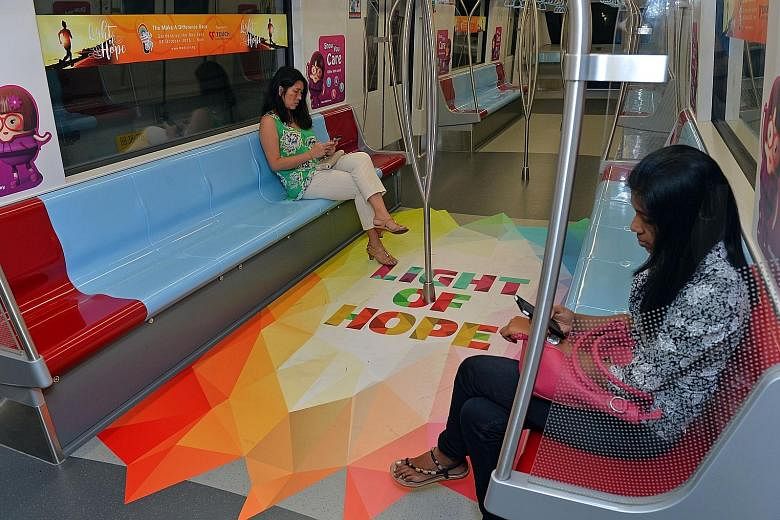When auditor Linette Sung was diagnosed with anxiety disorder, she relied on the strength and support of her loved ones to heal and emerge stronger than before.
Having made a full recovery, she now wants to make a difference for other anxiety sufferers by championing mental health awareness.
The 29-year-old is one of four volunteers seeking to reduce the stigma surrounding mental illness by raising public awareness.
Their cause is supported by Touch Community Services and the Land Transport Authority (LTA) which has commissioned an MRT train to display information regarding myths and facts about three key mental conditions: anxiety disorder, depression and schizophrenia.
-
Depression
-
COMMON SYMPTOMS
• Persistent sadness or a feeling of being down or gloomy.
• A loss of interest in activities previously enjoyed.
•Weight loss or weight gain, decrease or increase in appetite.
•Difficulty in falling asleep or staying asleep, or sleeping excessively.
•Feeling agitated or restless.
•Feeling tired and lacking energy.
•Feelings of worthlessness or excessive guilt.
•Difficulty in concentrating or having trouble thinking.
•Frequent thoughts of death or suicide.
DEALING WITH SYMPTOMS
•Eat well.
•Talk about your feelings with someone you trust.
•Develop a support network of people you feel can understand and encourage you.
•Keep active and exercise.
•Be kind to yourself. People suffering from depression need to accept that since their mental focus may be affected, their productivity may not be as good as before.
•Sources: Dr Zena Kang of Counselling Assessment and Therapy Services at Novena Medical Centre, and Dr Tor Phern Chern, consultant at the Department of General Psychiatry, Institute of Mental Health.
It was launched at Chinatown MRT station yesterday in an event officiated by Minister of State for Health Lam Pin Min. It will run on the 18-station Downtown Line until July 22 and be visible to around eight million commuters.
Designed by Touch volunteer and undergraduate Iris Tan, 23, the colourful stickers in the train's interior aim to lift the spirits of passengers on their daily commute.
Ms Tan said: "The rainbow is a symbol of hope. Whatever hardships you go through, there is hope."
The train is part of a campaign for the Make a Difference Race 2016, a mental health awareness run that will take place on Oct 8 at Gardens by the Bay and which aims to attract 3,000 runners.
Mr James Tan, executive director of Touch, said: "With mental health issues becoming more prevalent, the best form of support for people living with them must be found in the community. The Make a Difference Race hopes to rally the community to break down the social stigma associated with mental health conditions."
Ms Petrine Lim, principal social worker at Fei Yue Community Services, said that with an increased understanding of mental illness, "there are more people coming forward to seek help, even with their family members".
Ms Sung hopes the social stigma surrounding those who seek professional help for their mental conditions will become a thing of the past.
She said: "I felt that my voice should be louder. I've been there and my struggles are real. We want to raise awareness to tell people that there's help available, and that you're not on this journey alone."
Five myths about mental illness
MYTH: Depression is not treatable.
FACT: While depression may affect one's work, interests and daily life, it is one of the most treatable mental health conditions. Up to 80 per cent of patients respond positively to treatment.
MYTH: Depression will not happen to me.
FACT: Depression can happen to anyone. Nearly 6 per cent of the adult population in Singapore has suffered from a mental illness at some point in their lifetime.
MYTH: Anxiety disorder is incurable.
FACT: "Anxiety disorder" refers to a severe and prolonged state of anxiety that interferes with an individual's day-to-day activities. It is the most common of all mental disorders, and the correct treatment can alleviate the symptoms. Professional counselling and taking prescribed medication are two ways it may be treated.
MYTH: People with schizophrenia have multiple personalities.
FACT: Schizophrenia is a group of psychotic disorders caused by genetic, psychological and social factors. Symptoms include disturbances in thought and perception, which affect behaviour and communication. Social and family support is important in the recovery process.
MYTH: People with schizophrenia are violent and dangerous, and belong in a mental hospital.
FACT: Schizophrenics may behave unpredictably, but are not usually violent, especially if they are undergoing treatment. They reside in a mental hospital only if they need the facilities.
TOUCH COMMUNITY SERVICES

